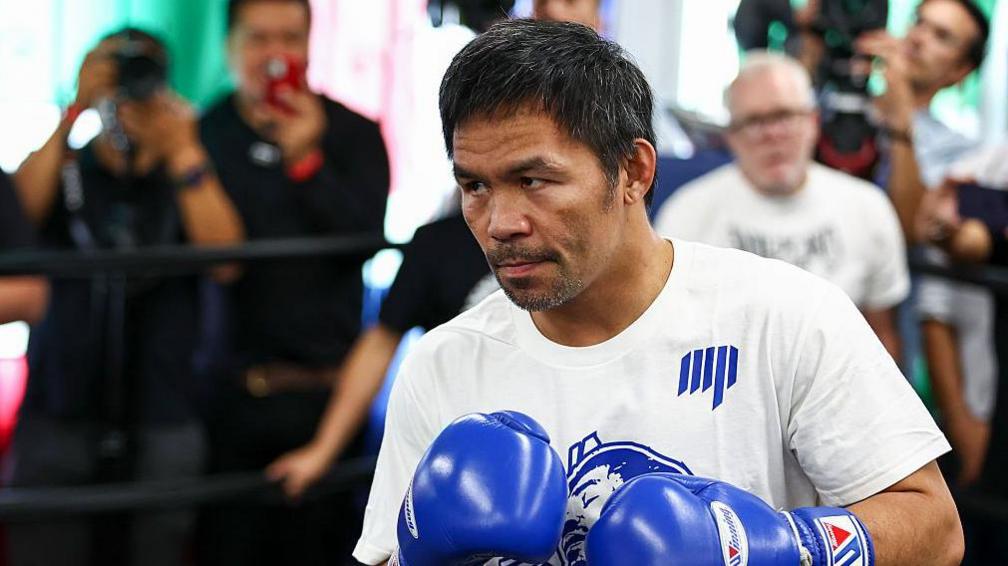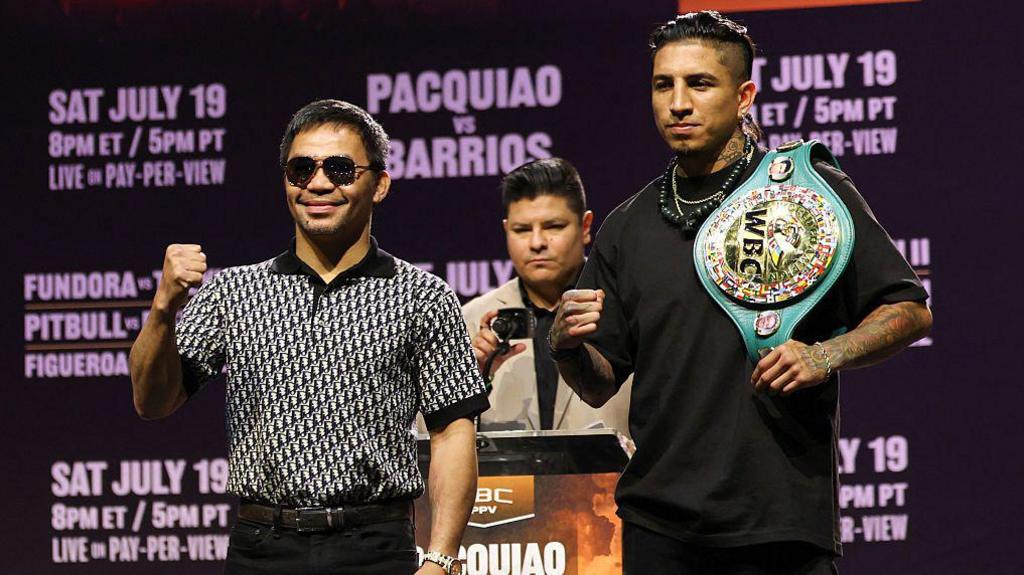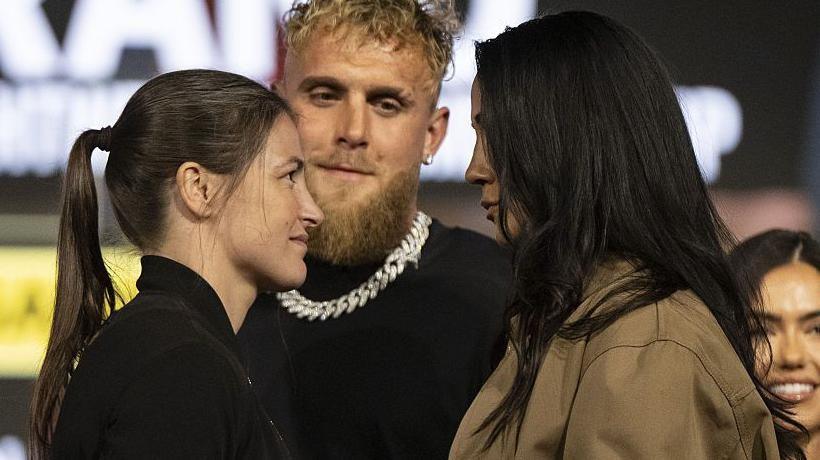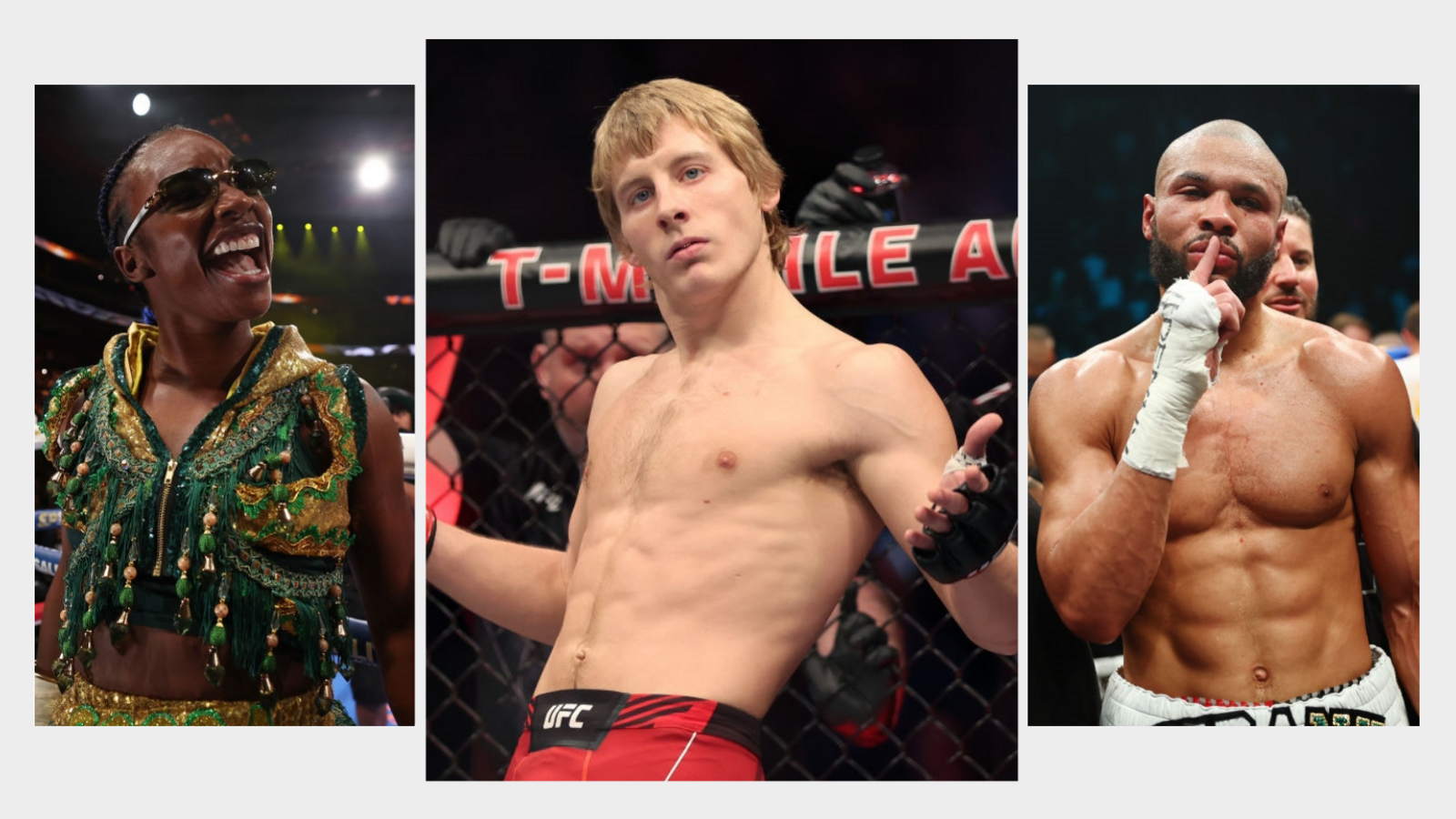'Why legend Pacquiao's return at 46 feels wrong'

Manny Pacquiao made his debut in 1995 and has won 62 pro fights, lost eight and drawn two
- Published
I won't be watching Manny Pacquiao's comeback fight on Saturday. It feels like a shortcut. A nod to nostalgia rather than merit, and that's unfair to fighters who are working their way up properly.
I realise that might sound harsh given he is one of the sport's all-time greats, an eight-division world champion. I have immense respect for what he achieved in his prime. He's a global icon, a true legend.
But he is 46. It has been six years since his previous pro win and the last time we saw him in a ring was in an uninspiring exhibition, which showed just how much his skills have faded.
So with all that in mind, I just cannot understand how he can jump into a sanctioned WBC world-title fight against Mario Barrios.
That's the part that really shocked me when I heard of Pacquiao's return. Usually, a fighter coming back from retirement eases into the sport with tune-up fights.
Not Pacquiao. He's skipping all that and going right to the front of the queue.
I had a brief exchange with Mauricio Sulaiman, the WBC president, on social media about this. He wasn't pleased with my doubt but, in my view, it sets a strange precedent and undermines the fighters who have been grinding their way up the ranks, paying their dues with tough fights.
We've seen comebacks before. We saw one with George Foreman, who fought his way back, winning tough fights en route to regaining the heavyweight title at the age of 45.
Pacquiao, however, hasn't fought a competitive bout in years. In the exhibition against Japanese fighter Rukiya Anpo last year, his movement was slow and his timing was completely off.
That's why it doesn't sit right with me. You can't just waltz back in, skipping the comeback phase, and jump straight into a world title fight because of your legendary status.
Can Pacquiao beat Barrios?
From a trainer's point of view, it's incredibly difficult to coach someone who is so far beyond their peak.
Pacquiao's style was very high energy - bouncing around, moving off angles and using his sharp reflexes. That's brilliant when you're young and fresh.
But when you're 46, you simply can't keep that up for 12 rounds. Your legs get tired. Your reflexes slow down. And when you get hit in the body, it slows you even more. Barrios will certainly try to work the body to slow Pacquiao down.
Opponents will study his movement and timing in the gym and build a strategy to exploit any weaknesses.
Perhaps Team Pacquiao think they can get the win because Barrios isn't the strongest champion in the division and is a beatable boxer. But he is a good fighter, puts his hands together well and experienced at top-level boxing.
The reality is, Pacquiao can't improve on what he did six years ago. It's going to be a huge challenge and I do expect Barrios to beat him up.
The worst thing that could happen? Pacquiao puts on a decent enough show, a moral victory, and thinks he can carry on - that would be dangerous long term.
Or he gets absolutely flattened like he did against Juan Manuel Marquez in 2012 - pummelled and battered, looking old and tired on the ropes.
Why is he doing it & should boxing stop legends returning?

American Barrios, 30, has won 29 pro fights, lost two and drawn one
Maybe Pacquiao is chasing the old days, but I do hope it's not just for the money. It would be sad if he's boxing again purely for a payday.
For my generation, Pacquiao's greatness is secure. A lot of fighters go on one or two fights too long; Sugar Ray Leonard did the same. It's sad, but it doesn't take away from their legacy.
Some younger fans, who only know him from social media, may judge him on what they see now - not really appreciating what he did in the past.
Pacquiao's comeback does raise important questions about how boxing manages fighters returning at an advanced age. Should there be stricter rules or age restrictions? It's a tricky balance.
Boxing is a sport where fighters' health and safety must come first, but it's also about individual choice. They're all adults.
Medical checks are in place, but clearly they don't stop everyone from fighting too long or jumping straight into top-level fights.
I'm not sure a hard age limit is the answer. Fighters like Bernard Hopkins and Foreman have shown it's possible to compete at an elite level into their late forties, albeit they are one of a few anomalies.
It's more about case-by-case assessments - how well a fighter moves, how much punishment they're taking. Getting hit at 46 is a lot more dangerous than at 26.
The best outcome is that I wake up on Sunday and find out Pacquiao has lost and will now walk away, safe and sound, knowing he had an unbelievable career.
Related topics
- Published19 August

- Published28 April 2024

More boxing from the BBC
- Published16 August
